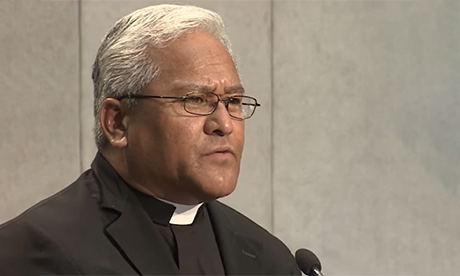Cardinal Soane Patita Mafi has a simple message for politicians attending next month’s COP26 climate conference in Glasgow – “Listen to the Pacific”.
“We want those big nations to really see and to really hear,” the Tongan-based prelate said in an interview with The Tablet.
“Not to pretend. Not to turn away. We want them not to be deafened to the cry of reality by other agendas. Can they turn an ear of love, not of political expediency? Are they prepared to hear the voice of the voiceless?”
The Cop26 climate conference is regarded by many as the last chance to avoid the worst that climate change presents.
For the senior Catholic church leader in the Pacific, it is vital that the peoples of the Pacific are not overlooked in Glasgow.
The islands are among the most vulnerable in the world, and Cardinal Mafi has emerged as one of their most eloquent advocates.
Mafi was consecrated just three months before the publication of Pope Francis’ encyclical, Laudato Si. The document calls for a widespread rebirth of spirituality and social and environmental awareness to combat climate change and redress the horrendous imbalance of power and wealth in society.
The cardinal is a member of the executive of Caritas Internationalis and the president of Caritas Oceania. The group has seven member organisations: Australia, Fiji, New Zealand, Papua New Guinea, Samoa, Solomon Islands and Tonga.
Across the Pacific Mafi sees climate change-induced problems in many Island states. These include deforestation in the Solomon Islands, people in Kiribati losing their homes, villages in Fiji forced to relocate owing to rising sea waters, vanishing foreshores and erosion.
Mafi recently spoke with Vatican Radio’s Linda Bordoni about the 2021 Caritas Oceania Annual Forum.
“Environmental protection, care for our common home is always a top priority in Oceania,” Cardinal Mafi explained. He pointed out that “one of our main treasures is the ocean”. It is the main source of the people’s livelihoods as well as our home.
Mafi explained that while the region has different ethnic groups, “we are so rich in that way with our diversity in culture.”
But they also have much in common, he added, “A common shared reality: we are all in this vast ocean, the Pacific, and I think the faith element is a strong element of our communality.”
He fears losing the traditional communal lifestyle would deprive people of the one resource they had to cope and prosper.
“This is worth more than so-called economic development and foreign-owned infrastructure.”
Sources
